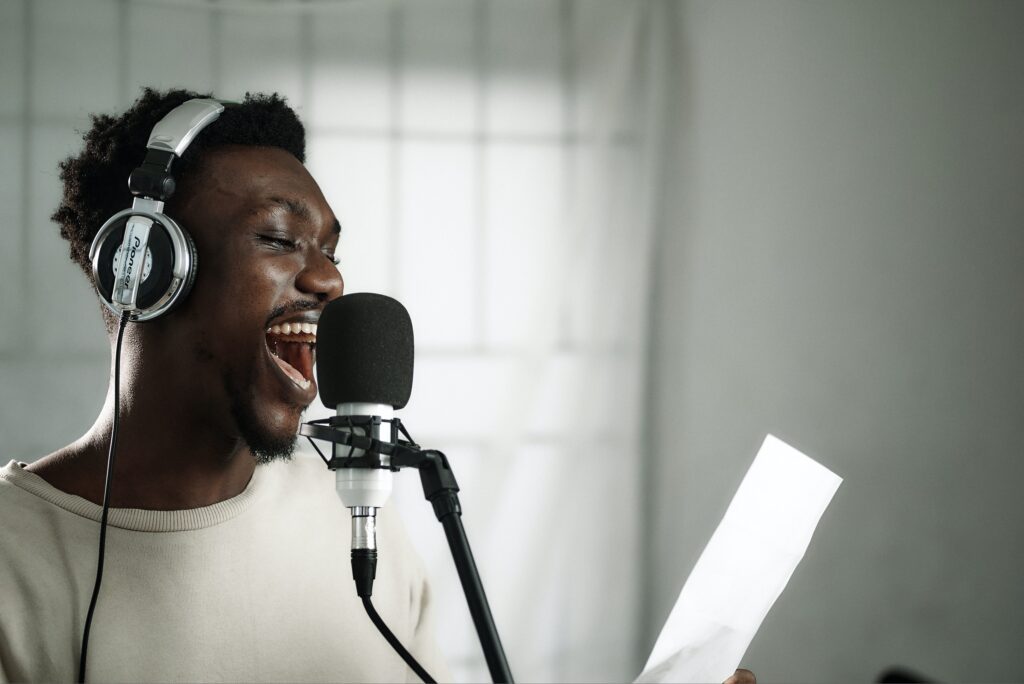Discover the power of your voice

If you’re an actor, you may have already discovered the power of your voice. You know how to deliver lines with emotion, inflection, and timing to bring a character to life. But did you know that your acting skills could translate into a successful career in voice-over work?
Voice-over work is a natural fit for actors, as it involves many of the same skills as traditional acting. In voice-over work, you use your voice to communicate a message to an audience, whether it’s a commercial, an animated character, or a video game hero. And while it may seem like a niche field, voice-over work is in high demand, and it can be a lucrative and rewarding career choice.
No matter the genre, the goal of voice-over work is to bring a script to life, engaging the listener and making the content more enjoyable and accessible.
Voice-over work can encompass a wide range of genres and
styles, including…
- ANIMATION
Voice actors are often called upon to bring animated characters to life with their vocal performances.
COMMERCIAL
Voice-over artists are frequently used in TV and radio commercials to sell products, services, or ideas.
DUBBING
In the process of dubbing, voice actors re-record dialogue in a different language or dialect to make a foreign-language film or TV show accessible to a wider audience.
NARRATION
Voice actors are often used to provide the voice-over for documentaries, audio books, educational videos, and other forms of non-fiction content.
VIDEO GAMES
Voice-over work in the video game industry has become increasingly important, with many games featuring fully voiced characters and dialogue.
RADIO
Radio voice-over work encompasses everything from DJ and traffic reports, to commercials and public service announcements.
TELEPHONE SYSTEMS
Voice-over artists are often used to record automated telephone systems, such as those used by banks, airlines, and government agencies.
So, how can you tell if you have the voice for voice-overs?
Here are a few things to consider…
First, do you have a strong vocal range?
As an actor, you’ve likely already developed your voice to some degree, but voice-over work requires a versatile voice that can adapt to a variety ot roles and styles. Whether you’re doing character voices or commercial work, you need to be able to deliver lines in a way that fits the character or brand. A clear and versatile voice is essential for a voice over artist. A voice that can convey a wide range of emotions and can adapt to different styles and accents. Sometimes your voice just needs to sound different and interesting or relatable to a product. For example a husky manly voice would suit the “Bunnings Warehouse” type of Voice overs.
Second, do you have good diction and pronunciation?
Voice-over work requires clear, precise speech, so it’s important to have excellent diction and be able to enunciate your words clearly. If you have a habit of mumbling or slurring your words, it might be a good idea to take some vocal classes to help train
your mouth to speak slower and enunciate more.
your mouth to speak slower and enunciate more.
Third, are you a natural performer?
As an actor, you know how to use your voice to convey emotion, improvise a scene and bring a character to life. These skills are crucial in voice- over work, where you need to be able to create a character or sell a product with your voice alone. Voice over artists are also often needed to be able to think on their feet and adjust their performance if required, sometimes on the fly, so being comfortable improvising is also a very valuable tool to have in your tool box.
Fourth, are you willing to put in the work?
Like any career, voice-over work requires dedication and effort. You’ll need to be willing to put in the time and effort to hone your skills, build a
portfolio, and market yourself to potential clients. This may mean taking classes, attending networking events, and creating a website or social media
presence to promote yourself and your work. Finally, do you have access to the right
equipment? While you don’t need to have a fancy studio to start out, having a good quality microphone and recording software can make a big difference in the quality of your recordings. You may also need to invest in a soundproofing setup or editing software
to polish your recordings to a professional level.
portfolio, and market yourself to potential clients. This may mean taking classes, attending networking events, and creating a website or social media
presence to promote yourself and your work. Finally, do you have access to the right
equipment? While you don’t need to have a fancy studio to start out, having a good quality microphone and recording software can make a big difference in the quality of your recordings. You may also need to invest in a soundproofing setup or editing software
to polish your recordings to a professional level.
So, what are you waiting for?
If you’re an actor with a passion for bringing words to life and a unique voice to match, voice-over work could be the perfect next step in your career. Don’t be shy, give it a try!
And remember, practice makes perfect, so keep honing your craft and expanding your skills. There are plenty of resources available to help you get started, from online courses to networking events to industry organizations. So, start exploring and see where your voice can take you!
Don’t forget to check out the OAS website to find out more and access industry resources and upcoming vocal and voice-over classes.

